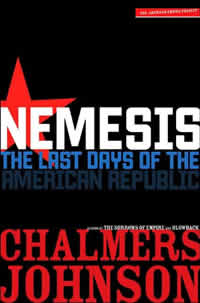Reflections by Dr. Gregory Klages on non-fiction books dealing primarily with politics, history, and religion. Significant attention to Canadian content. Mail me/comment if you read anything. I love to hear feedback!
Monday, 7 November 2011
Chalmers Johnson, "Nemesis: The Last Days of the American Republic" (2007)
Nemesis is the third in Johnson's 'American Empire Trilogy'. Dan Clendenin offers a succinct, accurate summary of the series at Journey with Jesus.
You can read significant portions of the text via Google Books.
All too often I write these summaries several weeks after having finished the text in question. This presents dangers and advantages. On one hand, the objectivity provided by some temporal distance from the reading experience helps to test the impressions made by the book. On the other, even the most thought-provoking ideas from the most well-written book – ideas that might benefit from prolonged consideration - can simply get lost in the challenges of managing daily life. To a certain degree, this is how I now experience Nemesis.
The book impressed me enough that I started to make notes. The notes were written on the back of a receipt, however, and do not go beyond cryptic comments such as, “pg. 73 – quote”.
Johnson’s American Empire Trilogy is an inspiring, chilling assessment of how the United States has developed as a global power since the Second World War, how that empire is likely to precipitously decline in the next few decades, and what the reasons for that decline currently appear to be. Nemesis explores the rise of a military state, where spending and policy prioritization is often driven by the needs of the military, the lobbyists hired by military contractors, and the elected officials and political constituencies who have come to depend on American domestic military spending. The need to pursue this sort of spending, and to control the domestic political process to allow the USA to carry out aggressive and often semi-secret military initiatives abroad also have led to a deteriorization in the practice of democracy in the country. The particular example explored in Nemesis is the growth of the Central Intelligence Agency, which can largely function (particularly in the waging of aggressive actions beyond the United States’ borders) without the consent of Congress, and is answerable only to the President, not Americans as a whole.
The increasing extension of the United States as a military empire – and by this I mean its creation of physical military facilities and properties explicitly intended to provide semi-permanent operating bases in foreign countries – holds significant risks for the country. While it calls for ongoing and significant spending, it also creates a certain tension between the countries who grow dependent – willingly or not – on that US military presence, while at the same time hating it and the cultural and political presumptions that they represent.
Johnson also explores, in a particularly scathing and informative chapter, the ridiculous record of US experimentation and investment in the militarization of space. He also wisely directs his readers’ attention to the very real problems – too rarely considered - that military conflict in space would pose. I was fascinated to read, for instance, the near instantaneous destruction that even a small explosion would likely cause for almost all satellites (aggressive or not, friendly or not). It is easy for us to forget how destructive something as minor as a screw flying through orbit at hundreds of kilometers an hour can be. Consider what fragments of an exploding satellite or ICBM would do the US military GPS satellite network.
A few last items purely of interest to me, I'm sure follow:
- pg. 73: Johnson quotes Michael Ignatieff, from the NY Times, 5 Jan. 2003: "Ever since George Washington warned his countrymen against foreign entanglements, empire abroad hasbeen seen as the republic's permanent temptation and its potential nemesis. Yet what word but 'empire' describes the awesome thing that America is becoming? It is the only nation that polices the world through five global military commands; maintains more than a million men and women at arms on four continents; deploys carrier battle groups on watch in every ocean; guarantees the survival of countries from Israel to South Korea; drives the wheels of global trade and commerce; and fills the hearts and minds of an entire planet with its dreams and desires."
- pg. 82: "the United States, protected from its inception to about 1940 by tariffs on manufactured importss that averaged 44 percent"
- pg. 89: "Imperialism and militarism will ultimately breach the separation of powers created to prevent tyranny and defend liberty. ...Rome and Britain are archetypes of the dilemma of combining democracy at home with an empire abroad. In the Roman case, they decided to hang on to the empire and lost their democracy. In the British case, they chose the opposite: in order to remain democratic they dumped their empire and military apparatus after World War II. For us [Americans], the choice is between the Roman and British precedents."
Here is a February 2007 Democracy Now! interview with Chalmers Johnson, regarding Nemesis.
Labels:
book reviews,
Cold War history,
Middle East,
military,
U.S.A. history
Subscribe to:
Comments (Atom)
